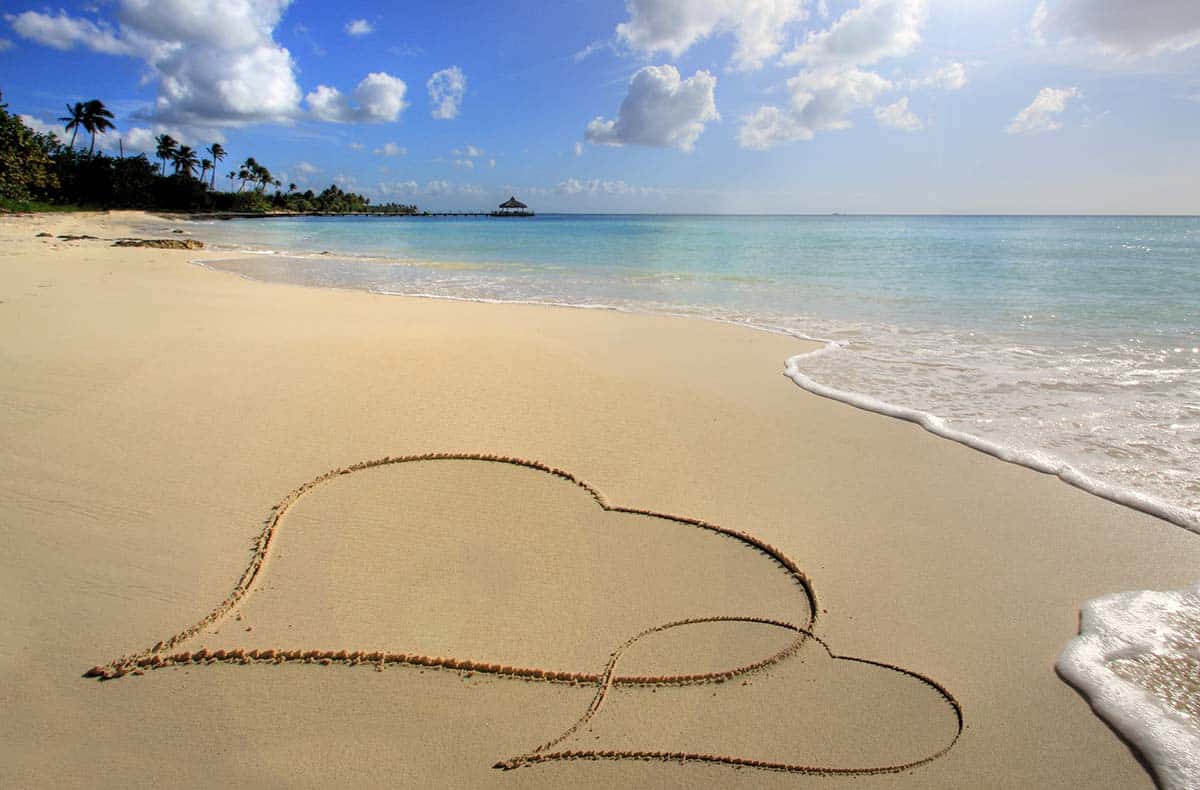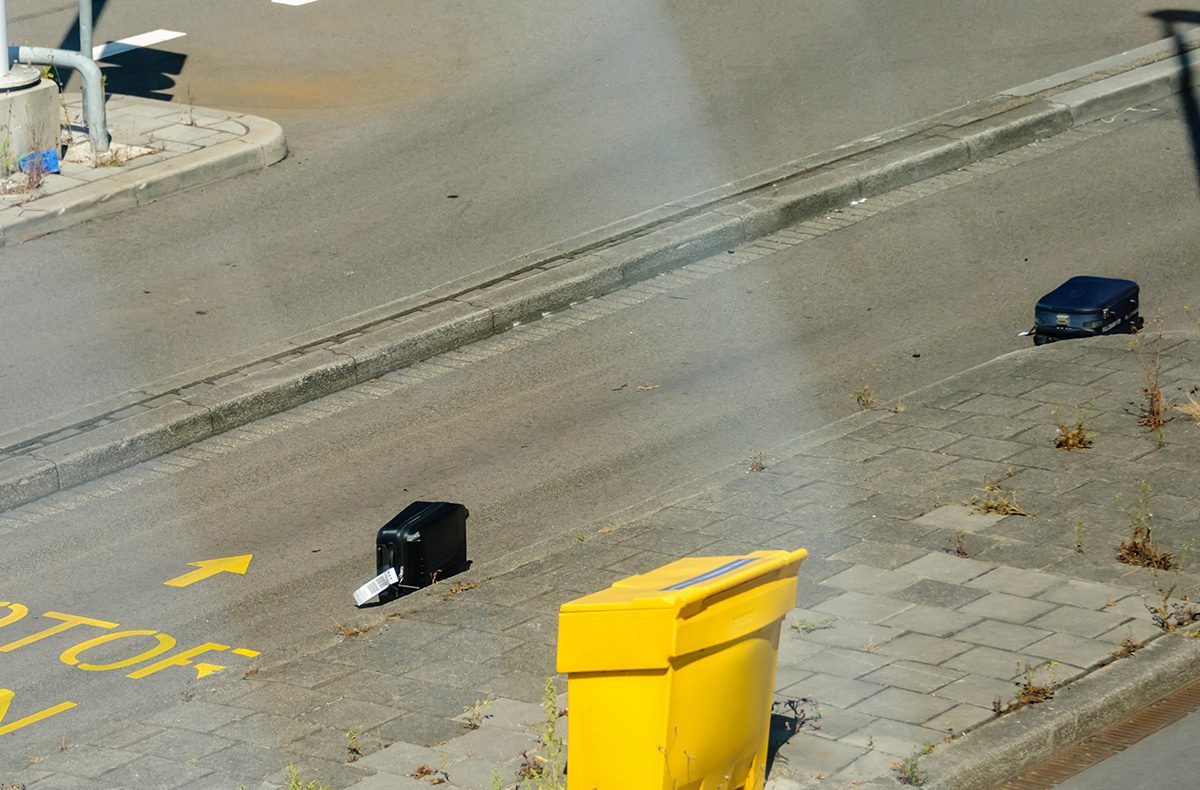
Reality television trafficks in dichotomies. Either contestants sashay away, or they live to see another episode. They stop being polite, and start getting real. They are either voted off the island, or receive the blessing of the Tribal Council. But these are all constructs. The 90 Day Fiancé franchise hinges on a very real binary—that someone may or may not have permission to try to make a life in the US. The show’s eight seasons and 16 spinoffs all center on the nerve-wracking, seamy, cringey, heartbreaking, sordid, and once-in-a-blue-moon sweet pursuit of the K-1 Visa, which “permits the foreign-citizen fiancé(e) to travel to the United States and marry his or her U.S. citizen sponsor within 90 days of arrival.” One imagines that the bureaucrats who concocted this legal process were, in fact, frustrated screenwriters or showrunners.
The show’s latest installment, “Love In Paradise: the Caribbean, a 90 Day Story” concerns four Caribbean entanglements. Though a gringa from the Tri-State (an area with a substantial Caribbean diaspora community), I have been thinking about the region a good deal during lockdown. Earlier this year, I collaborated with visual artist Johannah Herr on The Banana Republican Recipe Book, a volume that explores US corporate malfeasance in Latin America through the deeply troubling history of United Fruit, now known as Chiquita Brands. In exploring the rotten underbelly of America’s favorite fruit, my co-author and I had the book take the form of one of the many Chiquita banana recipe books the company put out over the 20th century. We used each recipe to illustrate an historical event.
The news cycle met the book’s appearance far more than halfway: last year saw anti-government protests in Colombia; crypto currency in El Salvador; a law-and-order Kamala Harris (“Do not come here! Do not come here!”) in Guatemala; a presidential assassination in Haiti; and, of course, roiling civil unrest in Cuba. Uncle Sam, broadly, and the CIA, specifically, have a lot of Caribbean blood on their hands. Tracing the history of the banana was a way of asking how and why Latin America is so unstable. In fact, the Cavendish banana monoculture itself turned out to be a handy metaphor for empire—and the American pursuit of a uniform, easily manipulated brand of exoticism.
One might say the same of the 90 Day franchise. The show is a testament to the extraordinary, even grotesque measures a person might take to arrive in the US. Its very premise assumes the existence of—if not the American dream—then at least a world so deeply lopsided in its distribution of opportunity and privilege that living a lie on its shores could feasibly be seen as preferable to carrying on almost anywhere else on the planet. The franchise is instructive in the transactional nature of empire, terms invariably set by the imperial power.
These are terms our neighbors to the south know all too well. Those headlines coming out of the Caribbean serve as a telling backdrop to an exceedingly timely 90 Day season. I believe each relationship illuminates something of a larger piece of the US role as an actor in the region. Each boasts the ingredients, if you will, of the power imbalance that continues to drive the Western Hemisphere’s saga of haves and have-nots. Notably, not all of the couples have too much disparity in career status or income. Yet, a brief tour—a short cruise, if you will—of their defining characteristics provides a telling look at the US self-image. It is a self-regard that remains astoundingly—even delusionally—robust after a year that nearly brought the nation to its knees.
Here are the four couples, as archetypes of Americans abroad:
The coddled white woman in paradise, or Amber and Daniel. The viewer can rest assured that the defining dichotomy of this iteration of 90 days is not immigration status itself, but rather being on vacation versus an entity referred to as “the real world” (NB, not the echt-reality show). This dichotomy is a construct only the vacationer can afford. Amber’s dubious sisters, Laci and Ashley, spew a fair amount of stark language familiar to the franchise. The lovebirds met while Amber was on vacation and Daniel was at a local club. So, on the one hand we have “fun,” “the honeymoon phase,” and “tropical fling”; on the other, we have, “coming back to real life,” “forever partner,” and, “now this is the real world.” The problem with said honeymoon phase is that it is financially untenable—for Amber.
The pursuit of the K-1 Visa doubles down on this issue: Daniel has lost his job because of Covid and falls into a catch-22 wherein he cannot afford the tools (e.g., a new phone) to do the necessary clerical legwork. Amber does not take this well. From afar, one understands her frustration and concern that she is now the sole breadwinner. But one day into her journey to Costa Rica to see Daniel, a 23-year-old Venezuelan refugee who has already remade his life once in a surfing town, Amber suffers a meltdown over gender roles. This follows an epic whine over the lack of A/C and the bugs—which she asserts do not exist in her native Florida.
After Daniel tells her he quit his job to have time to take the bus to the capitol to file paperwork for the visa, Amber launches into a monologue on the voiceover: “Growing up, I was always the tomboy. I had to be tough. I had to be strong. Being with Daniel, for the first time he made me feel like a woman. So for me to take on all the paperwork and be financially paying for everything, the roles have really flipped…I don’t want to wear the pants in the relationship. I’ve worn the pants my whole life. I want him to be the man. I wanna be that pretty girl that you’re willing to take care of.” She storms off and, fittingly for one with the luxury of taking a vacation, declares she is not hungry anymore.
Your island, my rules, or Martine and Steve. A series of Supreme Court rulings that date mostly from the Wilson administration are referred to as the Insular Cases. They handed down rulings about business transactions and rights in Puerto Rico, then a new US possession, seized from the Spanish during the Spanish-American War. These rulings are summed up as the following axiom about US conquest: “The Constitution does not follow the flag.” So it goes with Martine and Steve; Martine makes all the rules and sets all of the expectations. Steve throws the party—which Martine is upset continues in her absence. But such is life when you date a DJ. Though both partners’ perceptions of their shared reality tracks in their separate interviews, the expectations of what ought to happen next vary wildly.
Though in a three-year long-distance relationship, like many modern couples, the two have managed to stay in constant contact while really not communicating much at all. Steve, the DJ, has cheated on Martine once already. There has been rupture, but there has been no repair. He also has a six-year-old daughter and enjoys the space to raise her that the long-distance relationship gives him. Martine wants more: she feels only one thing will signal a path forward: a rock on her finger. In advance of her post-lockdown return to Barbados (her phrase, “cockblocked by Covid” might as well be a subtitle for the season), she declares her need for a marriage proposal to her friends, and she declares it to the camera crew. She does not, however, declare it to Steve—until her arrival. Once she does arrive, she gauges all intent in terms of Steve’s willingness to “spoil” her, while lashing out at “these fucking hoes,” such as a friendly waitress serving them Bajan rum punches.
No hablo español, o Mark y Key. Communication is a more literal stumbling block for Mark and Key. This couple has nostalgia going for them, and a very intense first round of romance. The pair met when Mark, a Californian, was working at a surf town hostel in Panama where Key, an Argentinian personal trainer, was on vacation. They hit it off, and had a vacation romance. Though sad to part ways, they kept in touch. One day, Key called Mark from Buenos Aires to tell him she had entered rehab for her Ketamine addiction. Mark dropped everything—admittedly, we don’t know exactly what—to be with her. He moved in with her family to help her through an outpatient program. For six months, he lived with her family but eventually they grew apart. Why? Well, by his own admission, Mark never bothered to learn Spanish—not even when he was in Argentina living with an Argentinian family for six months.
Nine years later, Key moved back to the town they met in and reached out to Mark on a whim. In the meantime, Key learned more English. Mark, despite his professed affinity for travel, still speaks no Spanish. Yet, the spark remained and Mark decided to go to Panama to convince Key—who is already baffled that she has any feelings for a “gringo”—that she should move to the US to be his wife. What he presumably does not know yet is that Key has no desire whatsoever to move to the States. She memorably says that there is “nothing special” about the US “except maybe the best peanut butter.” She is also non-monogamous—and not sure what to do with a chain of events she clearly set in motion. Only moments after their steamy reunion, Key is visibly frustrated by Mark’s failure to start a Duolingo routine in lockdown.
Naked tragedy, or Aryanna and Sherlon. The fourth couple is a riot of very cruel ironies. As Karen, Aryanna’s mother, says in the first episode, “I feel Aryanna is in for a rude awakening. I hope I am wrong.” Karen utters these words in a clothing store for infants; she will be a grandmother in roughly 10-12 weeks. Aryanna had traveled to Jamaica six months earlier largely because she was feeling herself. All of her life, she tells us, she was the fat girl with the pretty face. Finally, she had taken control of her fate, shed the excess pounds, got addicted to squats and weights, and was feeling great. A tropical vacation was in order. There, she met Sherlon who, by day, works for his father’s tourist boating company and has a side hustle at a nudist swingers’ resort. Sherlon cannot seem to get out of his own way. When we meet him, he is dragging his feet on K-1 Visa paperwork as Aryanna drags Karen up and down aisles of baby clothes. A family trip to Jamaica is planned.
Once there, Aryanna’s sister snipes at Sherlon, “Is this your first child or do you have some more kids with some more tourists?” It is, he assures them, his first. Karen is struggling to keep it together. Aryanna and Sherlon share a series of frightfully awkward and unnatural interactions. At every turn, we watch a woman who had just begun to come into her own crumbling, haunted by the physical insecurities that dogged her for her whole life—until that one moment she shed them….at a nudist swingers’ resort apparently short on condoms. Tearily, Aryanna tells the camera, “When I first met Sherlon, I was in the best physical shape of my whole entire life…Now I feel like I’m super uncomfortable in my body and I’m just at a point where I don’t even look pregnant, I just look really fat. I just feel extremely unattractive.” It’s hard not to feel for her, but it’s also hard not to feel something of Greek myth in her storyline, but with contouring and lash extensions instead of feathers and wax.
All four couples’ stories are highly illustrative, occasionally toxic, and fraught with fantasy, misconceptions, and arcane rules. And thanks to exactly these qualities, I cannot think of a finer lens through which to ponder Caribbean-US relations. You can bet I will be chewing the straw in my blender drink with voyeuristic anticipation when Season 2 airs.



